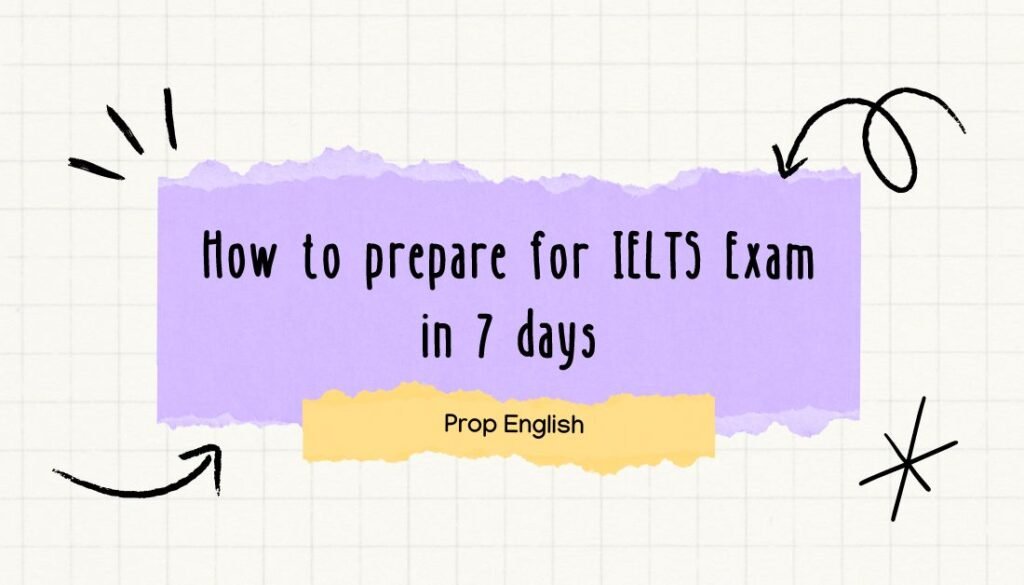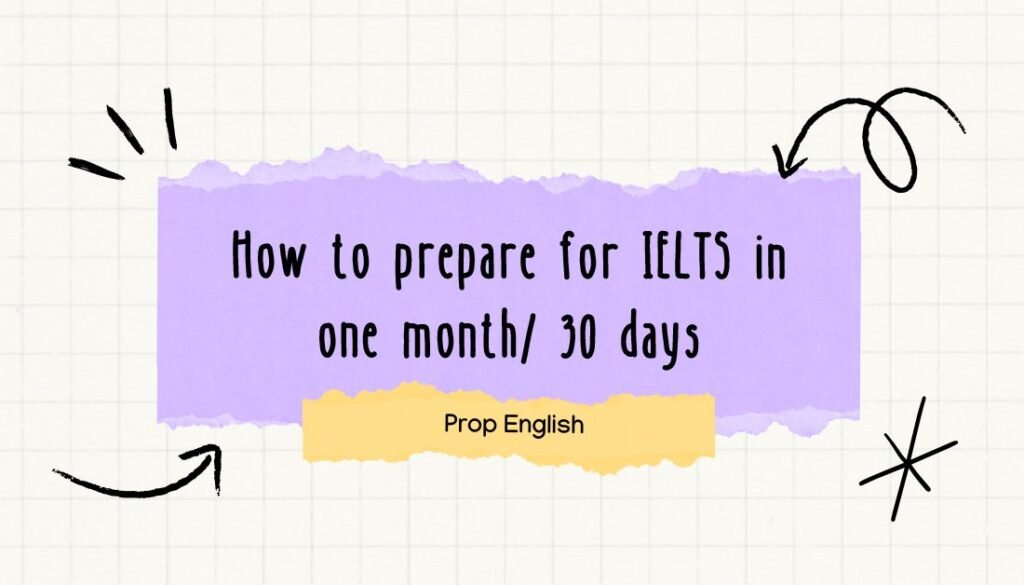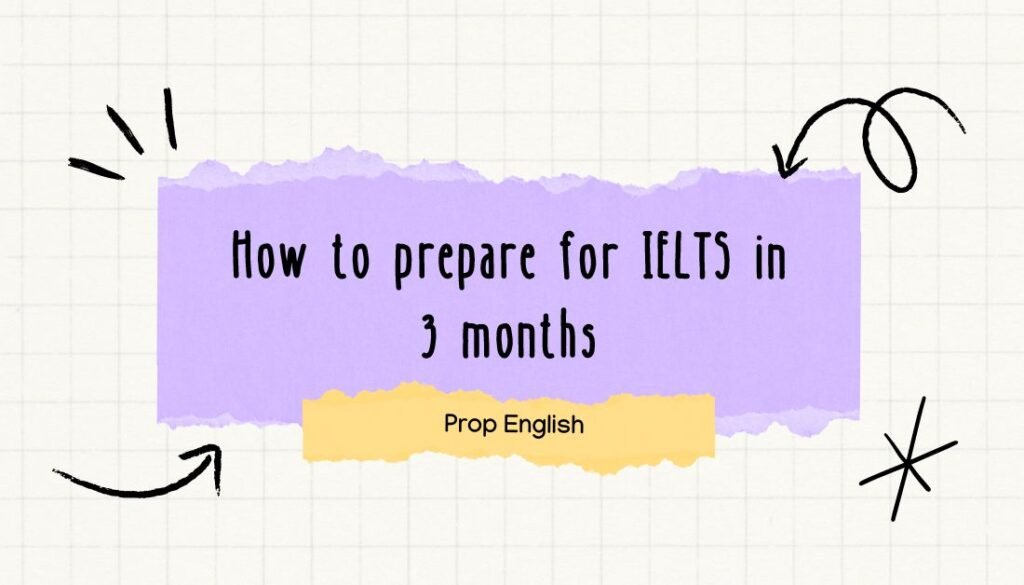How to practice for IELTS exam: Let’s discuss what you should do to prepare for your IELTS exam in seven days, one month, or three months. Each stage may take you more or less time depending on your level and how many hours a day you dedicate to your preparation. In any case, everyone should do all the essentials from the seven-day plan.
If you have some time left before your exam, start doing things from the one-month plan. If you still have some time, then move on to the three-month plan.
How to Practice for IELTS Exam in 7 Days?

Well, that’s an emergency situation when you have just a few days left before your exam. In this case, there is no time to improve your English skills, and any attempt to do so will be a waste of time. All you need to do is:
- learn about the exam format
- learn the main strategies that can help you perform better
- be more efficient during your exam, and avoid any silly mistakes that will harm your score.
1. Booking IELTS Exam
I assume you’ve already booked your test, but if not, first of all, check if you’re required to take IELTS Academic or General Training.
Then, decide what format suits you better, paper-based or computer-based. If you’re thinking about the computer-based test, take a practice test on the IDP website.
Then, you can learn about the platform and see if it actually suits you. When you’re booking the test, you can find all the tests on the IELTS.org website, and you’ll notice that some tests are UKVI (UK Visas and Immigration). If you’re coming to this country, you will probably be required to take this test, but sometimes you don’t. It’s the same test, just taken in a room with video cameras, and it’s more expensive. So, if you don’t need it, there is no point in booking it. [How to Practice for Ielts Exam]
2. Take the Full official IELTS practice test
The very first thing to do is to take a full official practice test. There is no better way to learn about the IELTS exam. In three hours, several practice tests are available on the official websites: IELTS.org, IDP, and British Council.
But the best tests are published by Cambridge English. These books are for both Academic or General Training, and ideally, try to get the most recent book. You can easily find these books on Google or your nearby bookstore.
3. IELTS Reading and Listening Preparation
Let’s talk about IELTS listening and reading preparation. You should do two things here.
- Learn about the test: Well, first of all, you should learn about the tests. How many questions do you actually need to answer correctly to pass your exam, how they are organized, what the answer sheet look like, how much time you’re gonna get, etc. You should know about all these in advance. There are also some strategies that can help you to be more efficient and answer as many questions as you can with your level of English. So, you should learn that.
- Learn how to manage your time: Learn how to manage your time. You’ll be short of time in IELTS, I promise, and you need to use every minute as efficiently as you can. So, take a few official practice tests in timed conditions and learn how quickly you need to go through the questions. That’s all. It may not sound like much, and it shouldn’t because you should spend most of your time and effort on IELTS writing and speaking. [How to Practice for Ielts Exam]
4. IELTS Writing
IELTS writing: Most people get their lowest score in IELTS writing, but some don’t spend too much time on it because, well, they don’t like writing essays. And who does? And then they don’t even know that it’s a problem. But you do, so you already have an advantage. Act on it.
- Learn the IELTS writing task requirements: First of all, you should learn about the IELTS writing requirements. They’re very specific, and if you don’t know about them, there is no chance you’re gonna hit them by chance. All the requirements are listed in the IELTS band descriptors. So, download the documents, study them, and find out what each requirement actually means and what you need to do to fulfill them.
- Learn about different tasks of the writing module: Next, learn about different types of tasks in Task 1 and Task 2 and learn what structure you should use in each task. Then, practice. Practice writing essays every day. You have 7 days? Well, then you can do 7 IELTS writing tests. You need to get up to speed and learn how to finish both tasks in 60 minutes.
- Practice IELTS writing with the official answer sheet: One last thing, if you are taking a paper-based exam, then download the answer sheet and practice writing your essays using a pencil. That’s what you’re expected to do during the exam. You need to know how long your answers should be to avoid counting words during your exam.
5. How to prepare for IELTS Speaking
The problem with it is the pressure. You’re in a room with the examiner. It’s quite stressful, and stress may affect performance. It’s also intense. There are a lot of questions and just 14 minutes, so you don’t have any breaks. You don’t have much time to pull your thoughts together. You have to answer, answer, answer. You need to prepare yourself for this grueling experience. [How to Practice for Ielts Exam]
- Watch one mock interview: First of all, watch one mock speaking exam. You don’t need to watch tons of them; that’s not helpful. But knowing what to expect, what it looks like, is helpful.
- Practice answering IELTS speaking questions: Then, practice answering IELTS speaking questions. Just read a question and answer aloud. Read the next question and so on.
- Time yourself: You also need to time yourself during the exam. Your examiner will be controlling the time, and they may interrupt you if you need to move on. But if your answers are too short, you don’t use all the opportunities to show your English skills. And if you’re talking for too long, the examiner will have to constantly interrupt you, which is quite distracting. So, try to learn how long your answers should be. The first and the third parts last up to five minutes, so make sure your answers are between 5 and 6 minutes. At home, Part 2 lasts up to 2 minutes, so try to talk for the full 2 minutes.
5. Learn the requirements
During your test, don’t think about the requirements; concentrate on being talkative and answering the questions. These are all the things you should do to prepare for your exam in one week, and it is possible to pass your exam at this point.
How to prepare for IELTS in one month/ 30 days

On the other hand, if you’re better prepared for your exam, you improve your chance of passing it. So, it would be silly not to use this opportunity if you haven’t. So, here are all the things you should do once you complete the initial stage of preparation. [How to Practice for Ielts Exam]
1. IELTS listening and reading
So, what can you do in one month? Well, first of all, it’s time to learn about the most difficult types of tasks.
- Learn strategies for the most difficult types of tasks: In seven days, you learn the strategies for these sections in general, but now you can learn about those tasks, which you find particularly challenging. For most people, these are in IELTS listening: multiple-choice questions and maps. In an IELTS reading: True/False/Not Given questions and matching headings. So, practice answering those questions. Also, in each practice test you take, I bet there are some questions, which you don’t answer correctly.
- Analyse your test results: Try to find the correct answer, try to understand why your answer is not correct. It will help you to get rid of some of the mistakes you make.
- Work on your listening skills: Start working on your listening skills. If you can’t understand everything in the recording. There is a great exercise you can do: First, you listen to the recording from your practice test, and you try to understand everything. You may listen to challenging bits several times. Then, open the transcript; it’s in the book. Listen to the recording again, following it in the book, and pay attention to all the bits you couldn’t understand. Of course, if you can’t understand a certain word just because you don’t know it, there is nothing you can do with it in a short period of time, but try to get to the point where you can hear everything you can understand in the text in front of you. Then, close the book and listen to the same recording again, trying to hear it. That’s how you develop your listening skills.
- Start reading in English: Start reading in English. Read newspapers, read articles, anything. Just try to get used to the practice of reading in English. If you have one month to prepare, it’s a great opportunity to improve your writing and speaking skills.
Students also read: How to Pass IELTS Exam in First Attempt: Top 10 Tips
2. IELTS Writing
For the IELTS writing task: to get a Band 7 score, you need to write good essays, and not all schools teach you how to do that. So, it’s time to learn. [How to Practice for Ielts Exam]
- Learn what to write in the writing task: Learn what to write in each part of your answers, how to organize your introduction, your conclusion, and how to write your body paragraphs – the most important parts of your essays.
- Learn linking words for Task 1 and Task 2: IELTS examiners also check if your ideas are connected. So, learn about different ways to connect your ideas, and you will definitely need to use a variety of linking words such as ‘despite,’ ‘however,’ ‘furthermore,’ and so on. So, learn them. You have time.
- Learn vocabulary for Task 1: It’s also time to start learning some vocabulary for your Task 1. For example, academic Task 1 is about describing a chart, a map, a diagram, or a table, and it requires words we don’t use every day. So, you have time to learn them, and it will help you improve your score. In IELTS General Training, you need to write a letter, and in this letter, you must use the correct tone in the form of semi-formal or formal. So, learn about the differences in informal and formal styles, and learn some phrases for letters. It will help you. In that case, you must learn phrases for letters informal/informal tone.
- Practice: Next, practice writing Task 1 and Task 2 answers. You may not like doing that, but you have to force yourself. The more you write, the better you get.
- Use recent topics: It’s great to practice using recent topics. We’ve collected topics from recent exams.
4. IELTS Speaking preparation
If you don’t live in an English-speaking country and you don’t speak English outside of the classroom, and you don’t really speak English in the classroom either because there are just a lot of pupils, so there is no opportunity, and then it’s not surprising that this skill is underdeveloped.
So, it’s time to start working on your speaking skills.
- Speak English every day: Set yourself a target to speak English 15 minutes a day, and you can talk about anything. Did you watch a movie last night? Talk about it. Did something happen and you want to talk to your friend? Imagine that you’re talking to your friend in English and keep on complaining for 15 minutes. The more you talk, the better you get.
- Practice answering difficult IELTS topics: And also practice answering difficult IELTS speaking questions. Of course, IELTS examiners use a lot of topics, but still, if you download our guide with recent topics and you practice answering those you find particularly challenging, it’s a great exercise for you. Also, there is always a chance that you’re gonna get this topic in your exam, and talking about something you’ve recently discussed is always easier. [How to Practice for Ielts Exam]
How to prepare for IELTS in 3 months

You have time. Imagine how many practice tests you could do, but that won’t help. There is no point in doing a million of mock tests. You’ve already learned the IELTS strategies. Now it’s time to work on your English skills.
1. IELTS Listening
Listen to books, podcasts, and news in English. It doesn’t have to be IELTS-related. Just listen to people speaking English. It’s a passive skill, so you improve it by just listening. Get familiar with British and American accents, with a particular emphasis on the British accent. They sound slightly different. You may not recognize even a familiar word if you’re not familiar with these differences in pronunciation. So learn both. There are many other accents, but I think if you’re familiar with the two main ones, you’ll be all right.
2. IELTS Reading
To succeed in IELTS reading, you need to read fast, and you need to know a lot of words. I think you need to have the widest vocabulary for this section. So read IELTS-related articles and learn new words. The more you read, the faster you read, and the more words you know, the easier it is for you to read.
IELTS academic reading: So for IELTS Academic, read more scientific style articles, such as the science magazine or the science section on the BBC website.
IELTS general training: For IELTS General Training, just read things in English: news, job descriptions, instructions, everything you normally read but in English.
3. IELTS Writing
It’s difficult to write a great essay if you don’t know much about the topic and if you lack the topic-specific vocabulary. [How to Practice for Ielts Exam]
Do topic research: So what you can do is you can start doing research for your essays. Choose topics which are commonly used in IELTS. So choose one, and then go on the internet and find articles on this topic. Try to find good sources: newspapers or large websites to ensure that you’re reading high-quality articles. And then read, analyze them:
- see what ideas they use, write them down,
- see which words they use, write them down
- see how they organize ideas
- how they split them into different paragraphs, and how they connect ideas.
It will help you improve your writing on all levels.
4. IELTS Speaking
Learn pronunciation: If you have some time before your exam, learn more about English pronunciation. 25% of your speaking score depends on your pronunciation, not your accent, but your pronunciation. So learn how to pronounce each sound in English, how to merge words into groups, and how to use rhythm and intonation in your speech. You can find videos on YouTube for free, you can take a course on Udemy, they cost like 10-15 dollars.
Practice speaking daily: Speak English every day. You can talk to yourself, you can find a speaking partner online. There are bunches of websites, which can help you find a speaking partner. Or you can find a speaking buddy on social media. For example, if you join English-learning Facebook groups. Then you can approach someone who is already looking for somebody as an English-speaking partner.
You can take speaking lessons with a native-speaking teacher if that’s what you’re interested in. I highly recommend Cambly.
Conclusion
In this article, You read about how you can prepare for your IELTS exam. We discussed how you can prepare for the exam if you have less time like one week. [How to Practice for Ielts Exam] But if you have 1 month and 3 months then how can you prepare for the IELTS exam. After knowing these tips, all you need is a positive mindset, dedication, and a well-planned schedule for the IELTS exam preparation. I hope you liked this article.
Thank you so much for reading me today. Good luck with your preparation and your exam.
Students also read: How to Improve IELTS Speaking From 5.5 to 7 Bands